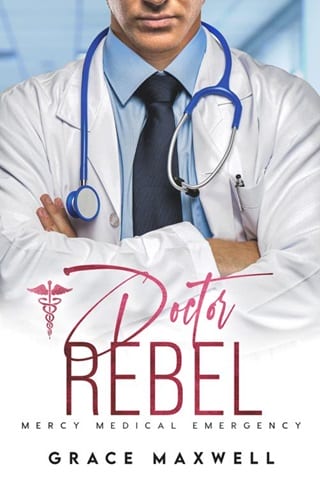Chapter 30
Chance
The clock ticks past the end of Wednesday's night shift, but I'm still here, hunched over electronic medical charts on Thursday morning, determined to whittle down my backlog. I think I'm also determined to keep my mind occupied. Lucy hasn't confirmed whether she's accepting my invitation to dinner or not, so all I can do is wait. I force my focus back to the computer in front of me, and it's quiet for a moment, just the hum of the hospital and my clicking on the screen, until the double doors burst open.
"Dr. Devereaux!" Julie's voice slices through the lull, sharp and urgent. She's one of the nurses that's just come on for the next shift. My head snaps up. She's panting, face flushed.
"Julie?" I'm on my feet.
"It's a one-year-old female, unresponsive in her crib. She's breathing but just barely," she gasps. "Parents live close, drove her straight here. "
Adrenaline spikes as I throw the chart I've been working on down on the desk and sprint to the room where the little girl lies, limp and frighteningly pale. Her chest barely moves, her lips tinged with a blue that sends a cold shiver down my spine.
"Talk to me," I command, even as I assess her vitals. No spontaneous heart activity. Cyanosis setting in.
"McGill forceps, now!" The tool is slapped into my hand, and I gently slide the tube down her tiny throat. One of the nurses, a blur at the periphery of my focus, starts bagging her, forcing life-giving air into lungs that have given up the fight.
"Has she been sick recently?" My voice is steady, clinical, as I look up at the parents—a mother and father clutching each other.
"No," the mother chokes out, tears streaming over cheeks pulled tight with distress. "She was fine… just fine…"
"Okay, okay." I nod, though my brain is racing ahead, cataloging symptoms, discarding possibilities. We'll get her stable first, then figure out the why. Because there's always a why...
"Any medications we should know about?" I ask, my gaze shifting from the child's face to her parents. They shake their heads almost in unison, their voices adamant as they respond. "She's not taking anything."
"Could she have gotten into something under a sink or on a bedside table?" I prod.
"No," the mother wails.
"Melissa," I say, directing my attention to the nurse at my side, who already has her kit prepared. "We need an IV, now." She nods, her hands steady as she searches for a suitable vein in the child's arm. My eyes flit back to the monitor.
"Got it," Melissa confirms. The small catheter slides into place, securing our lifeline.
"Let's check her glucose," I add, anticipation tightening my chest.
Melissa pricks the child's finger and reads the number that flashes on the glucometer. "Blood sugar's twenty."
I curse under my breath. That's far too low. Hypoglycemia . It fits the puzzle, but we're far from done. "We need dextrose. Get me an eighteen-gauge spinal needle."
Nurses gently roll the baby onto her side, her tiny body so fragile. I take the needle, ready the dextrose, and administer it. It feels like forever, but only seconds pass before I'm listening to her lungs once more.
"Breathing sounds better," I murmur. Relief floods through me, but it's tempered by the knowledge that the day is just beginning. There are still answers to find, treatments to administer. But for now, this little girl's life is no longer slipping through my fingers like grains of sand. She's stabilizing, and that's a victory. "Let's get a blood gas, CBC, and chem seven," I announce.
The room moves in swift response, each nurse taking up her task with urgency but no sign of panic, a perfect reflection of our training. As they work, I turn to face the worried parents, who hover like anxious shadows at the edge of the emergency bay.
"Your daughter is going to be fine," I tell them, meeting their eyes with an assurance I've learned to muster. It's not a lie, but a promise I'm determined to keep. Their bodies sag with relief as they continue to hold onto each other.
Turning back to my patient, I scan the monitors, noting the numbers that indicate a battle being won. "Do either of you have a family history of diabetes type one?" I ask, peering over my shoulder at them.
They shake their heads, their expressions a mix of confusion and concern. "No, nothing like that," the mother says.
"Okay." I nod, processing this new information. "Nonetheless, it looks like she may be diabetic. We're stabilizing her now, and I'll summon our on-call pediatric endocrinologist. They'll be down shortly to get things set up and explain everything. Diabetes is very manageable, especially with early intervention like this."
After a bit of further discussion, the doctor arrives, and I step away from the relieved parents, leaving them in good hands. My mind is already shifting gears, and I pull out my cell. No messages. Then I spot Julie, her clipboard a shield against the onslaught of emergencies.
"Update?" I ask her.
"There's a rep from Prometheus Health waiting for you."
I nod. "Don't let them leave. What else?"
"Room two, woman with a broken femur waiting for ortho," she says, her eyes moving to the electronic board tracking the chaos. "And we've got an ambo incoming, firefighter with severe burns."
"Notify the burn unit. We'll need them on standby." The words are out before the weight of another critical patient truly registers. Like muscle memory, I tug on a fresh paper gown and snap on new gloves.
The ambulance bay doors rattle open, and the morning spills in with a gust carrying the acrid scent of smoke. The EMT meets my gaze, his eyes betraying the severity of what's inside the vehicle. "Thirty-year-old male, building collapse, extensive burns."
With a nod, I accept responsibility as he hands control of the gurney to me. "Let's move," I command. I brace myself for the next battle, ready to fight fire with science and willpower.
I scan the firefighter, taking in the expanse of white, charred flesh where his gear failed him, a stark contrast to the blistered and angry redness that speaks of second-degree burns on his hands, his face.
"Airway's clear," Melissa reports, her professionalism as unwavering, as if we're dealing with a sprained ankle instead of a man's life hanging by a thread. She's got an IV line in already. I'm thankful for her speed. It means pain management can start posthaste, and we can pump him full of fluids before his body gives up entirely on trying to retain moisture .
"Watch for respiratory distress," I instruct, hearing the rasp of his breath, the soot-stained wheeze that tells me his lungs aren't untouched. When he coughs, black mucus splatters against the gurney, a grim painting of what he must have inhaled.
"Got it, Dr. Devereaux," she replies.
The ambulance crew helps us wheel him to the elevator; our steps are swift but careful, a dance of urgency and precision.
"Prepare for intubation," I tell them, even as I feel the pull of fatigue in my limbs. It's been a long night. The elevator doors close, and I get him intubated. He's stable enough now for the burn unit upstairs, where real decisions will be made, where they'll chart out his future one graft at a time.
Once he's handed off, the adrenaline that's been fueling me ebbs away. My body slumps against the wall for just a moment, and then I head back downstairs.
Julie sees me coming down the hallway. "His name is Tom Lohman, and he's outside your office."
I nod and continue on until I reach my office. "Hi. I'm Dr. Chance Devereaux."
Tom stands. "Great to meet you. Sorry I haven't been by sooner. My wife and I just had our third child, and I took some paternity leave."
I shut the door behind us, and we sit down. "I'm glad you're here now. When I took over the ED six months ago, Eleanor Thompson didn't leave me any information on the study we're doing with you. I can't even find the contract. I'm hoping you can help me. I don't know what's going on."
"Absolutely." He pulls out his phone, and with a few clicks, he's emailed it to me. "The contract is pretty detailed. But the drug is being administered to some of your repeat visitors who are unhoused. I met with each of them and got their signed consent. The drug we're developing doesn't have to be administered on a regular basis. The first goal is boosting their immunity, as they have a higher risk of exposure to illness because of their lifestyle. The other component is a mental-health medication. It doesn't work like more targeted drugs because monitoring patients in this situation is nearly impossible. Instead, it's an antidepressant that releases over time, boosting overall outlook and energy. We've seen a lot of great response, and Mercy has been wonderful with the data."
I nod. "We've continued to collect the data but don't know where to send it, and it's pretty raw because I don't know what you're looking for."
"The person who took over for me during my parental leave didn't realize that was part of the job, and both Eleanor and I both left around the same time, so it was bad timing on all our parts. But that's okay. If you want to give me the data, we can compile it."
"I'd love a hard copy of the contract. And I'd also love any records you have about where the payments for the study are being deposited. I don't know where that money goes."
He nods. "I will have someone send you over the contract today. It was signed by the CEO of the hospital, and it pays one hundred thousand dollars twice a year."
My eyes go wide.
"From what she told me, Eleanor was using the money as bonuses for the nursing staff," Tom continues. "As you know, the ED is constantly short of nurses. She could have used the money to hire someone to compile the data, but instead, she was doing the compiling so she could keep the money for her team."
Thank goodness it was nothing nefarious. Why she left no record of this behind is a little confusing, but perhaps she had her reasons. "How much longer does the trial continue?"
"Three more years."
I nod. "I also want that money for my staff. If you don't mind compiling the data for the current batch and then perhaps someone can show me what you want from us. I can do it moving forward."
He agrees, and we talk a short while longer, making plans for some training for me. He assures me he'll be by early next week to collect the data.
Once he leaves, I deal with a patient looking for opioids and refer her to a pain-management specialist. My shift is long over, but as I peel off my gloves, sticky with sweat and the day's grime, there's a prickling at the back of my mind, a voice that never quite quiets down. You can do better.
And I know it's right; there's always more to learn, another technique to master, another life to save. As I drag myself toward the locker room, each step feels heavier than the last, especially when I still have no response from Lucy. But that voice—it keeps me moving forward. It's the relentless pulse behind every choice I make, the insatiable desire to be better tomorrow than I am today.
 Fullepub
Fullepub 



